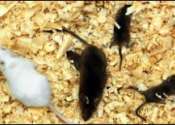Study suggests link between tumor suppressors and starvation survival
A particular tumor suppressor gene that fights cancer cells does more than clamp down on unabated cell division—the hallmark of the disease—it also can help make cells more fit by allowing them to fend off stress, says ...

